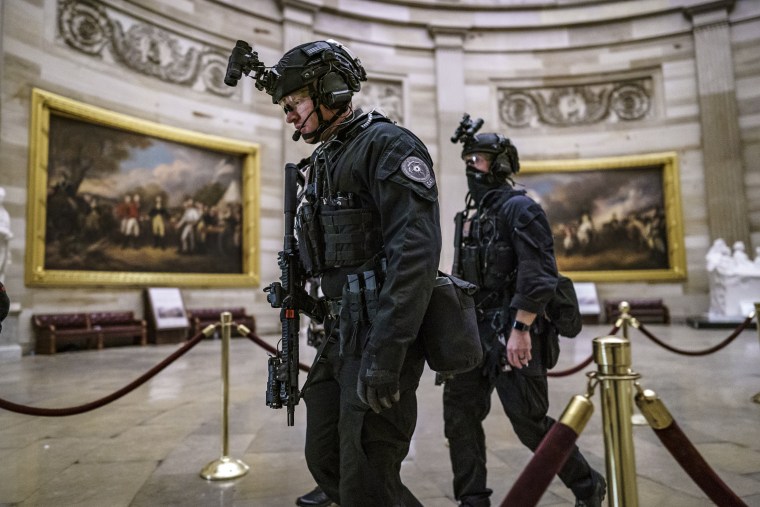WASHINGTON — The Secret Service has no new text messages related to the Jan. 6 attack to hand over to the special House committee investigating the Capitol riot, a source familiar with the matter told NBC News on Tuesday.
The news comes in the wake of an inspector general informing the committee that the Secret Service had deleted text messages from Jan. 5 and 6, 2021. The committee issued a subpoena for those records last week.
The Secret Service plans to do a “forensic examination” of agents’ phones identified in the inspector general’s report, the source said, but added that the agency does not expect this will yield relevant emails or other records.
The Washington Post first reported that the Secret Service had no new text messages to turn over to Congress. The Jan. 6 panel had given the Secret Service until Tuesday morning to turn over the text messages it had subpoenaed.
“We received a letter today that did provide us with a lot of documents and some data. However, we did not receive the additional text messages that we were looking for,” Rep. Stephanie Murphy, D-Fla., a member of the Jan. 6 panel, said on MSNBC.

The Secret Service turned over only one text message conversation, according to the letter, which was obtained by NBC News. Rep. Zoe Lofgren, D-Calif., said in an interview with MSNBC on Tuesday that “we got one text message” but that, "it is clear to me, that is a text message that may have been captured through another branch of government."
According to the letter, the conversation was related to a request from then-U.S. Capitol Police Chief Steven Sund to former Secret Service Uniformed Division Chief Thomas Sullivan for assistance on Jan. 6, 2021.
Also on Tuesday, the National Archives asked the Secret Service to investigate the “potential unauthorized deletion” of the text messages.
The National Archives and Records Administration “requests that the Secret Service look into this matter,” an agency official, Laurence Brewer, wrote in a letter to Damian Kokinda, an official overseeing records at the Department of Homeland Security.
At the Aspen Security Forum on Tuesday evening, DHS Secretary Alejandro Mayorkas promised that the Secret Service, which is part of his department, would cooperate fully with inquiries from the Jan. 6 committee and others into what happened with the missing text messages.
Asked by MSNBC correspondent Trymaine Lee whether he believes the texts were deleted by accident, Mayorkas said, “The migration was planned well before January 2021,” referring to a data migration that Secret Service has blamed for the deletions. “I think the facts will be disclosed and we will address the facts as they are learned, or continue to be learned, and we will learn from it.”
The DHS inspector general sent a letter to congressional committees last week informing them that the Secret Service had deleted texts. Homeland Security Inspector General Joseph Cuffari said he was told that the texts were erased after he requested records of electronic communications tied to the insurrection, “as part of a device-replacement program.”
Shortly after Cuffari briefed all nine Jan. 6 committee members on Friday, the special panel issued a subpoena for those Secret Service text messages and other records from Jan. 5 and 6.
Committee members believe that the texts could corroborate aspects of testimony from former White House aide Cassidy Hutchinson, who told the panel that then-President Donald Trump became furious when he was not allowed to join his supporters at the Capitol on Jan. 6 and got into a physical altercation with his lead Secret Service agent in the presidential SUV.
A Secret Service spokesperson had vehemently disputed allegations by DHS' inspector general that the text messages had been erased. Spokesman Anthony Guglielmi said data from some phones had been lost as part of a "pre-planned, three-month system migration" but that the Secret Service was continuing to cooperate with the Jan. 6 panel.
In a separate statement, Guglielmi said that the Secret Service delivered on Tuesday morning an "initial set" of thousands of documents and records to the Jan. 6 panel in response to the subpoena. The documents include "Secret Service cell phone use and other policies, as well as operational and planning records," he said.
"The United States Secret Service has been and continues to be fully cooperative with the January 6th Select Committee," Gugliemi said in a statement to NBC News.
"We continue to scrutinize our records, databases, and archives to ensure full compliance with the Committee’s subpoena," he continued. "We are taking all feasible steps to identify records responsive to the subpoena, to include forensic examinations of agency phones and other investigative techniques."
In the lengthy statement, Gugliemi also said the Secret Service "fully respects and supports the important role" of the National Archives.
"The agency will have our full cooperation in this review and we will complete the internal review of our information as directed and promptly respond to their inquiry," Guglielmi continued. "The Secret Service has long standing established policies regarding the retention of Government Records."
If the Secret Service determines that any text messages have been improperly deleted, the National Archives official wrote Tuesday, then the agency must send the National Archives a report within 30 days with a report documenting the deletion.
That report, the National Archives official said, must include a description of the records affected, a statement of the circumstances surrounding the deletion of the messages, and a statement of “safeguards” put in place to prevent further loss of records.

